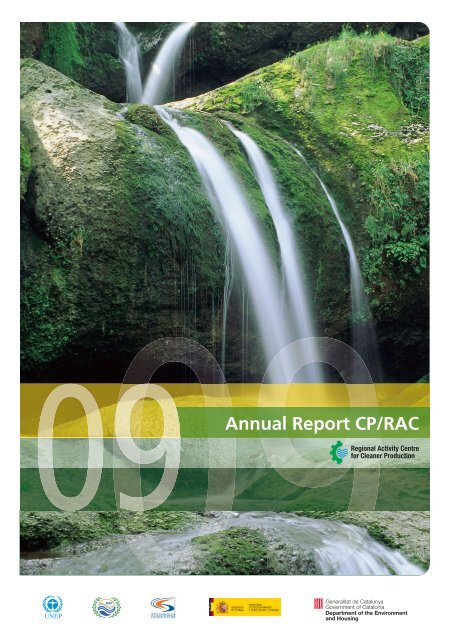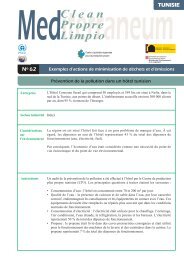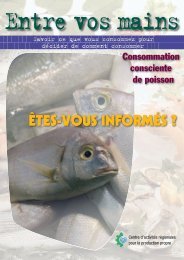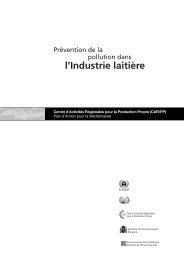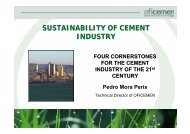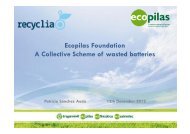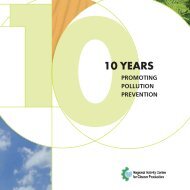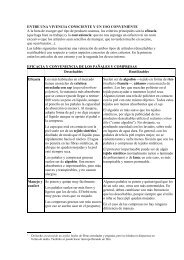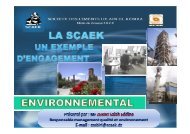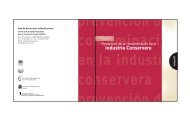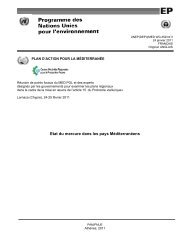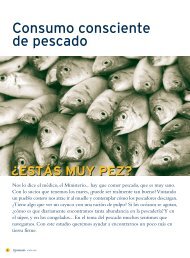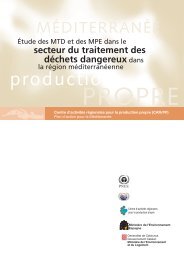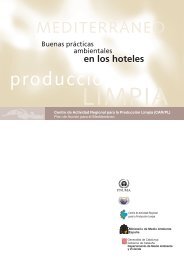English - Regional Activity Centre for Cleaner Production
English - Regional Activity Centre for Cleaner Production
English - Regional Activity Centre for Cleaner Production
Create successful ePaper yourself
Turn your PDF publications into a flip-book with our unique Google optimized e-Paper software.
Annual report CP/RAC 2009UNEPMAP<strong>Regional</strong> <strong>Activity</strong> <strong>Centre</strong><strong>for</strong> <strong>Cleaner</strong> <strong>Production</strong>GOBIERNODE ESPAÑAMINISTERIODE MEDIOAMBIENTEY MEDIO RURAL Y MARINOGeneralitat de CatalunyaGovernment of CataloniaDepartment of the Environmentand Housing
© <strong>Regional</strong> <strong>Activity</strong> <strong>Centre</strong><strong>for</strong> <strong>Cleaner</strong> <strong>Production</strong> (CP/RAC)C/ Dr. Roux, 8008017 Barcelona (Spain)Tel.: +34 93 553 87 90Fax: +34 93 553 87 95E-mail: cleanpro@cprac.orghttp://www.cprac.orgD.L.: B. 10.183-2010First edition: march 2010
4 | INDEX ANNUAL REPORT CP/RAC 20092.8. Support the preparation of national profiles <strong>for</strong> SAICM at the petition of the countries(according to availability of funds) .......................................................................................................................................................... 392.9. Advise and support the Contracting Parties on how to implement the UNEP programmeon mercury and other heavy metals and the EU Mercury Strategy ............................................................. 392.10. <strong>Regional</strong> Seminar on the presentation and implantation of REACH ......................................................... 402.11. Preparation of Working Plans and reports on the Stockholm Convention ........................................ 41IV. Annexes ............................................................................................................................................................................................................................................................... 45
I. PresentationThe <strong>Regional</strong> Activities <strong>Centre</strong> <strong>for</strong> <strong>Cleaner</strong> <strong>Production</strong> (RAC/CP) was created in 1996 at the requestof the Conference of the Contracting Parties to the Barcelona Convention. Since then it <strong>for</strong>mspart of the Mediterranean Action Plan (MAP), a programme under the auspices of the UnitedNations Environmental Plan UNEP. The centre’s mission is to “promote mechanisms <strong>for</strong> the elaborationof sustainable models of consumption and management of chemical substances in the Mediterranean”.In January 2008, during the 15 th Meeting of the Contracting Parties to the Convention <strong>for</strong> the Protectionof the Marine Environment and the Protocols thereof (COP-15), the main objectives and lines of work ofthe RAC/CP were established <strong>for</strong> the following two years. Thus, the Working Plan and the Budget <strong>for</strong> theperiod 2008-2009 were approved.Based on the objectives marked by its mission, during 2008-2009, the RAC/CP rein<strong>for</strong>ced its actions aimedat the promotion of sustainable consumption and production, creating alliances with the MarrakechProcess, the global initiative <strong>for</strong> Sustainable Consumption and <strong>Production</strong> promoted by the UNEP, and theDepartment of Economic and Social Affairs of the United Nations. Furthermore, the <strong>Centre</strong> gained a decisiveposition in the field of the rational management of chemical substances thanks to its official recognitionas <strong>Regional</strong> <strong>Centre</strong> by the Stockholm Convention.In 2009 the <strong>Centre</strong>’s willingness to collaborate with other relevant actors in the Mediterranean took on specialimportance. As a result, the signing of agreements during this year increased substantially, reaching atotal of 18, the highest number achieved in all the trajectory of the RAC/CP. What is more, in line with itswillingness to disseminate knowledge and awareness, there was an increase in the design of communicativematerials and the systems used were modernised, fully entering the age of online communication.In carrying out its mission to promote sustainable production and consumption and the rational managementof chemical substances, the RAC/CP places special emphasis on three specific areas, in which the<strong>Centre</strong> has notable experience and great potential: the diffusion of cleaner production and green competitiveness,through the GRECO Initiative, sustainable production and, finally, the rational management ofchemical substances, strengthened by the ratification of the <strong>Centre</strong> as a <strong>Regional</strong> <strong>Centre</strong> <strong>for</strong> the StockholmConvention on Persistent Organic Pollutants. In the first case, the need to mobilise the private sector and,specifically, the Mediterranean business sector, is recognised as vital, as this is where the more sustainableproduction methods will finally be applied. In the area of consumption, a key objective considered is theidentification of patterns of sustainable consumption and mechanisms to transmit them to society in general,through the use of systems suitable <strong>for</strong> the new in<strong>for</strong>mation and communications systems. To this endthe <strong>Centre</strong> has made great ef<strong>for</strong>ts to facilitate access to its documentation and, at the same time, proactivelyaddress civil society through universities and NGO’s. Finally, as far as the rational management ofchemical substances is concerned, the <strong>Centre</strong> is working to clear the Mediterranean Sea of hazardous chemicalsubstances, working hand in hand with both the private and the public sectors in each of the countries<strong>for</strong>ming part of the MAP.The <strong>Centre</strong> has worked to this end in 2008 and 2009, carrying out the activities which are detailedbelow.
II. Main achievements
ANNUAL REPORT CP/RAC 2009 II. MAIN ACHIEVEMENTS | 9Main achievements—Ratification of the RAC/CP as a <strong>Regional</strong> <strong>Centre</strong> <strong>for</strong> the Stockholm Convention on Persistent OrganicPollutants in the COP IV of the Stockholm Convention, held in Geneva from the 4 th to the 8 th of May 2009.This new status recognises the work carried out by the <strong>Centre</strong> <strong>for</strong> the Rational Management of ChemicalSubstances and implies motivation and a new challenge to be faced: protect the health of people and theenvironment against the negative effects of Persistent Organic Pollutants (POP’s).—Approval of the new mandate of the RAC/CP by the representatives of the signatory countries of the XVConference of the Contracting Parties to the Barcelona Convention held in Marrakech from the 2 nd to the4 th November 2009. The objective established <strong>for</strong> the RAC/CP was to contribute to the prevention of contaminationand the sustainable management of services and products, and the use of mechanisms leadingto patterns of sustainable consumption and production.—Approval of the 5 year working plan 2010-2015 and the activities of the working plan 2010-2011 in theSignatory Countries Conference celebrated in Marrakech; in both the six priority axis of the MediterraneanAction Plan were identified. They include Sustainable Consumption and <strong>Production</strong>, relating this subject toothers such as Climate Change; Biodiversity, Protection of Coastal Zones, (…)—Consolidation of the GRECO initiative with its presentation in Morocco, Egypt, Tunisia and Turkey, whereit counted with a wide representation from the industrial world and public administrations with maximumrepresentation from the Ministries of Industry and Environment.—Launch of the project Global Environment Facility (GEF) <strong>for</strong> Training and Awareness in the Mediterraneancountries in the management of Polychlorinated Biphenyls (PCB’s) in the national electricity companies. Thisproject is promoted by the Mediterranean Action Plan with GEF funds. The RAC/CP plays an important rolein this project through training in the countries where it will be implanted: Lebanon, Libya, Egypt, Albaniaand Syria.
III. Report on activities 20091. Sustainable Consumption and <strong>Production</strong>2. Rational Management of Chemical Substances
ANNUAL REPORT CP/RAC 2009 III. REPORT ON ACTIVITIES 2009 | 13Among the most outstanding activities in2009, it is important to underline theactions undertaken in each of the areasmarked: Sustainable Consumption and<strong>Production</strong> (SCP) and the Rational Management ofChemical Substances (RMCS). Fundamentally outstandingis the role of diffusion and training of theRAC/CP in SCP materials, through the organisationof seminars and publications. All of these have beenput together based on projects, studies and reportscarried out by the <strong>Centre</strong>.The range of these activities can be appreciatedthrough the following table and details:SCP RMCS TOTALStudies/Reports 15 8 23Seminars/meetings 12 5 17Documents — 4 4Projects 1 — 1Agreements signed 10 8 18Communications Materials 22 3 25Online plat<strong>for</strong>ms 5 — 5Annex I.1. Sustainable consumption and productionAIM. Promote the application of the mechanismsthat lead to models of sustainable consumptionand production in the countries ofthe Mediterranean.Objective 1. Review the tendencies of the Mediterraneancountries in the area of SustainableConsumption and <strong>Production</strong> (SCP), and the identificationof the main agents involved at the national,regional, and local levels.Objective 2. Achieve the participation of the keyactors in the application of methods of SustainableConsumption and <strong>Production</strong> (SCP).Objective 3. Promote the transition to productionof Mediterranean goods and services that have lessenvironmental impact and the introduction of sustainabilitycriteria in the supply chains and managementof companies and organisations.Objective 4. Promote changes in the behaviour ofconsumers towards goods and services that haveless impact on the environment and towards sustainablelifestyles.Objective 5. Promote green competitivenessamongst the companies of the Mediterranean.IntroductionSocieties are gradually becoming more aware ofthe fact that their production and consumptionactivities have an increasing impact on the environment.In fact, in the present situation —in whichthe phenomena of globalisation are accelerating theinterconnection of the flow of materials, resources,and energy between all points of the planet at avertiginous pace— we are also more conscious ofthe cause-effect relationship which our particularactivities have on territories distant from our location,and at world level, in spite of the fact that it istrue that we can cause a greater impact on theEarth.To put it briefly, we have increased our capacity tovisualise the cause-effect relationships which, onlya few years ago, were only visible to a small groupsof specialised academicians. There<strong>for</strong>e today, morethan ever, the local becomes global and vice-versa.This capacity that we have acquired, of being ableto relate our specific, finite actions to effects thatcan be felt at a great distance and on a greaterscale, gives us a golden opportunity, and a great
14 | III. REPORT ON ACTIVITIES 2009 ANNUAL REPORT CP/RAC 2009potential <strong>for</strong> exceptional action in all areas: to carryout actions with a more global impact with aview to improve our behaviour towards our physicaland social surroundings.In this context, over the last few years societieshave increased their perception of the inseparablerelationship that exists between production andconsumption. This is due, to a large extent, to theever more important role that unsustainable consumptionhas had as a motor <strong>for</strong> impacts at environmental,economic and social levels: impacts thatare not caused directly by production per se, but byregularly increasing consumption, with which anincreasing amount of energy and resources isdirectly associated.Consequently, more and more public policies arebeing carried out which integrate both sides of thesame coin, consumption and production, whichcan now no longer possibly be seen as manageableseparately. An indication of this increasingperception is the number of national strategiesthat many countries have recently developed onSustainable Consumption and <strong>Production</strong>. All thesehave been driven by the United Nations, sincethe Johannesburg Summit in 2002, through theMarrakech Process. The Marrakech Process, inwhich the RAC/CP collaborates, promotes a changein production and consumption patterns at worldlevel, in order to achieve a change in the presenttendencies and make them compatible with theplanet and human activity.This tendency arrives at the same time as the greatestchallenge that humanity has ever faced, climatechange, and it is widely known that this challengerequires additional ef<strong>for</strong>ts, and effective <strong>for</strong>cefuland innovative action at all levels, immediate incharacter. This is why climate change was definedas a priority working area on government agendas,the United Nations Environment Programme(UNEP) and the Mediterranean Action Plan (MAP),amongst many others. 2008 and 2009 are keyyears in world politics, given that the route to followwas being prepared in 2009, the most ambitiousand global policy ever adopted with respectto environmental questions and lifestyle in general,directly affecting our models of production andconsumption.
ANNUAL REPORT CP/RAC 2009 III. REPORT ON ACTIVITIES 2009 | 15Activities1.1. Review of the tendencies of theMediterranean countries in the areaof Sustainable Consumption and<strong>Production</strong> (SCP), in the industrial sector1.2. Evaluation of consumer tendenciesin the MediterraneanIn 2008, an updated Report on the Situation ofSustainable Consumption and <strong>Production</strong> (SCP) inthe Mediterranean Region was prepared.During the first half of 2009, the report wasfinalised and revised. It includes profiles <strong>for</strong> 18countries in the Mediterranean and a regionalreport. The document constitutes an essentialsource of in<strong>for</strong>mation <strong>for</strong> the analysis of generaltendencies in the Mediterranean Region in thiscontext. The in<strong>for</strong>mation contained in the reportdistinguishes between three different groups in theMediterranean; The Balkans, The EU States andthe countries of the South and Middle East.The most notable conclusions of the report referto the main environmental impacts caused byindustrial development, and the progress madeby Mediterranean countries in the promotion andadaptation of cleaner production processes and efficiencyin industry, together with other mechanismssuch as ecological labelling, green public purchasingand corporate social responsibility in companies,which introduce sustainable criteria into systemsof production and consumption.The report will be published with the title Stepstowards Sustainable Consumption and <strong>Production</strong>in the Mediterranean on the web page of theRAC/CP, in <strong>English</strong>, Spanish and French, and will bedistributed to all the Mediterranean institutionsinterested in this question.Global Survey into Sustainable LifestylesThe RAC/CP collaborated with the UNEP the diffusionof Global Survey into Sustainable Lifestyles.The objective of the survey was to obtain real in<strong>for</strong>mationon how people use energy, how they reactto advertisements and what they think of sustainablelifestyles. The survey has a global objective,and divides the objectives according to countries,ages, and place of residence. The RAC/CP hastranslated the report into Arabic with the aim ofhelping Egyptian consumers participate in the survey.The <strong>Centre</strong> also published the survey in Spainand Malta through online instruments such as electronicmail or Facebook.Study Sustainable Fishing in theMediterraneanThe RAC/CP has published the study SustainableFishing in the Mediterranean which analyses the
16 | III. REPORT ON ACTIVITIES 2009 ANNUAL REPORT CP/RAC 2009present situation on the consumption of fish inthe Mediterranean countries. The study answersquestions such as “Is the consumption of shellfishin the Mediterranean sustainable?” or “Is fishingproduction in the Mediterranean sustainable?”Further, it proposes measures to promote sustainableconsumption and highlights the aspects tobe considered in sustainable fishing. Finally, itexplains the limitations of the human and financialresources that affect fishing in the Mediterranean.Directives: the best environmental practices inthe nautical sectorThe RAC/CP has collaborated with the FundacióMar and Nereo to obtain an interactive guide tothe Best Environmental Practices <strong>for</strong> the nauticalsector. The guide is addressed to vessel managementcompanies and to small leisure boat shipbuilders,giving assessment in the use of materialswith less environmental impact and techniques <strong>for</strong>better management practices, and will be availableon the <strong>Centre</strong>’s new web page.—In<strong>for</strong>m on the principle SCP initiatives pertinentto the region.—Facilitate the debate on the links between climatechange and consumption and production inchains of value.—Identify the main challenges in the Mediterranean<strong>for</strong> the implementation of SCP and the relatedmechanisms.The round table mixed master class presentationswith thematic panels, with speakers of renownedprestige, together with eight work group sessions.1.3. Mediterranean conference onSustainable Consumption and <strong>Production</strong>The first Mediterranean Round Table on SustainableConsumption and <strong>Production</strong> was held in Barcelona,Spain from the 5 th to the 7 th of November2008. The event was organised with the support ofthe Technological, Economic and Industrial Divisionof UNEP, leader in the Marrakech Process. The principleobjectives were:—Promote awareness and debate on the need tochange to SCP in the Mediterranean Region.The groups reached conclusions and <strong>for</strong>mulatedrecommendations that were shared during a fullsession. They contributed the main results to theround table, making a valuable contribution onthe part of experts and representatives of variousinstitutions, <strong>for</strong> both the Mediterranean public andthe private sectors, with the identification of theprincipal priorities, challenges and opportunities <strong>for</strong>the introduction of SCP in the region. These conclusionshave contributed to the projection of theworking lines of the new working programmes <strong>for</strong>the biennial 2010-2011.From the relations of the Round Table, the cooperationbetween the RAC/CP and the UNEP has
ANNUAL REPORT CP/RAC 2009 III. REPORT ON ACTIVITIES 2009 | 17been strengthened. As a consequence, a Memorandumof Understanding (MoU) betweenboth organisations has been signed. The mainresult of the agreement in 2009 has been the supportof the RAC/CP in the application of the projectYouthXchange of the UNEP in Turkey, Croatiaand countries of the Southern Mediterranean andalso the joint participation of UNEP and RAC/CPin the Atlantis Youth Camp and the support of theTechnological, Economic and Industrial Division ofUNEP to the University Network <strong>for</strong> SustainableDevelopment in the Mediterranean (UNMed).At the end of the year the RAC/CP published anagile, fundamentally visual leaflet bringing togetherthe main conclusions of the meeting, whichmeans that this valuable in<strong>for</strong>mation will not belost.1.4. Creation of associations with the keySCP actorsThe RAC/CP has been in contact with importantactors such as the Red Cross and the World WildlifeFund (WWF) to cooperate in the promotion of SCP.With the aim of making these relations official, the<strong>Centre</strong> has signed a general Memorandum ofUnderstanding, which demonstrates the willingnessto collaborate.The centre has also signed Memorandums ofUnderstanding with the UNEP / MAP committing tosending reports every six months and, with theUNEP, the aim of maintaining regular communicationand contact and organise meetings every sixmonths.1.5. Promotion of dialogue and debatewith interested partiesThe RAC/CP is conscious of the need to takemeasures in higher education in order to offer students,teachers, the university community, futurebusiness, industrial and technical people, and adeeper vision of Sustainable Consumption and<strong>Production</strong> and of rational management of chemicalsubstances.The University Network <strong>for</strong> Sustainable Developmentin the Mediterranean (UNMed) is aRAC/CP project based on cooperation and the creationof networks. The creation of associations withkey actors and the promotion of dialogue anddebate are the activities that have been carried outby the <strong>Centre</strong> in recent years. In 2009 the RAC/CPis promoting the next step, a Mediterranean networkbased on a pilot project in three Mediterraneancountries (to facilitate monitoring and evaluation).The Mediterranean Network project centres on:—The promotion of courses on Sustainable Consumptionand <strong>Production</strong> and rational managementof chemical substances.—The establishment of associations with universitiesand the promotion of said cooperationbetween universities of the Mediterranean.—The creation of a database of professors andresearchers in the Mediterranean.
18 | III. REPORT ON ACTIVITIES 2009 ANNUAL REPORT CP/RAC 2009The RAC/CP is in contact with universities andNGO’s to set up this project based on the creationof capacities in universities of the Mediterranean,The project consists of organising different seminars<strong>for</strong> university professors and presenting themas three e-courses (online courses):—Course on the prevention of contamination incompanies; available on the web page of theRAC/CP.—Course on Environmental Policy.—Course on consumption and climate change.The RAC/CP carried out a pilot project in Egypt duringthe month of May, which was repeated inSeptember in Malta. On the 22 nd and 23 rd ofOctober, the seminar “Integration of Education inSustainable Consumption and <strong>Production</strong> intoexisting university programmes”, organised by theRAC/CP with the collaboration of the University ofMalta and the <strong>Centre</strong> <strong>for</strong> Clean Technology washeld in Malta. More than 25 university professorsparticipated in the event, the objective of whichwas that university professors could include conceptssuch as Sustainable Consumption and <strong>Production</strong>or rational management of chemical substancesinto their classes.The seminar was extremely participative, includingthe techniques that the RAC/CP is introducing intoits meetings, with the aim of increasing interest andimproving results.The participants also worked in groups to give theiropinion on the pros and cons of the introduction ofSCP into university study plans and designed astrategy to achieve this objective.The conclusions of the seminar were the following:• The University Network <strong>for</strong> the MediterraneanRegion (UNMed) received great support from theprofessors from Malta and the interested parties;they showed great interest in the subject and theproject.• The professors came from various faculties. Theyshowed great interest and participation.• The model of seminar was very positive as it invitedpeople to participation and debate.• The participants support the project of continuingthe work to introduce SCP in Maltese universityplans of studies.• The feedback on the seminar was very positive.• The synergies have begun: <strong>for</strong> some participantsit was the first time that they had heard of theSCP experiences in the Maltese universities.1.6. Promotion of IPPC principlesin Mediterranean countriesThis activity was carried out within the frameworkof the programme of collaboration between MAP,the European Commission and the Horizon Initiative2020, whose objective is providing supportand uniting ef<strong>for</strong>ts <strong>for</strong> existing initiatives in theMediterranean region, giving them additionalimpulse in order to help them achieve their goals ofdecontamination of the region. The Clean <strong>Production</strong><strong>Regional</strong> <strong>Activity</strong> <strong>Centre</strong> (RAC/CP) organiseda meeting with the collaboration of the IPPC
ANNUAL REPORT CP/RAC 2009 III. REPORT ON ACTIVITIES 2009 | 19office, the European Commission MEDPPOL andVITO.The first meeting was held in June 2008 at theOffice of the IPPC in Seville, the nerve-centre ofthe application of the Directive in Europe, which supportedand participated in the meeting. Followingthe meeting, a list of conclusions was elaborated,which included the importance of prevention andcontrol to allow sustainable industrial development,highlighting the idea that obtaining profits is notincompatible with environmental improvement.The second meeting was held on the 21 st and 22 ndof October 2009 in Istanbul, Turkey, in collaborationwith The Turkish Industrialist’s and Businessman’sAssociation (TUSIAD), with the support andcollaboration of the Turkish Ministry of theEnvironment and Forestry, the National Forum <strong>for</strong>Best Available Techniques and Integrated PollutionPrevention and Control (IPPC): Mechanisms toincrease Green Competitiveness in Turkey.The objective of the Forum was to in<strong>for</strong>m the participantsabout the advantages and opportunitiesoffered by adopting the Green Book <strong>for</strong> competitivenessin industry and the application of the focusof the IPPC Directive in the Turkish national systems<strong>for</strong> controlling industrial pollution.The morning session of the first day of the Forumcentred on highlighting the economic benefitsimplied by the adoption of Best Available Technologies(BAT) and the cleanest technologies. Theafternoon session centred in IPPC and addressed amore technical audience which included participantsfrom the public sector (the Ministries of theEnvironment and Industry), companies and civilsociety in Turkey.There<strong>for</strong>e the IPPC Seminar centred on:—The application of an integrated system <strong>for</strong> theconcession of permits <strong>for</strong> industrial activities;the advantages of a single administration of controland of environmental licensing in comparisonwith the habitual system of specific licences.—The experience of BAT in the process <strong>for</strong> thegranting of licences to industrial installations andto go from the control of contamination to theprevention of contamination.—The steps to be taken <strong>for</strong> the application ofIPPC.—Exchange experiences on the approach tothe IPPC Directive and the lessons learnedfrom the EU countries and the new MemberStates.—Offer recommendations on the new steps tobe followed to approach the IPPC Directive inTurkey.
20 | III. REPORT ON ACTIVITIES 2009 ANNUAL REPORT CP/RAC 2009Latest Actions:—The RAC/CP has taken the recommendationsof the working seminar into account, and it isintroducing the creation of capacities <strong>for</strong> theIPPC as a key question in the Horizon Initiative2020.—The studies of the RAC/CP on PAB and MPA inthe principal Mediterranean industrial sectors arebeing updated and they include energy efficiency.—The IPPC has been included as the most adequatejudicial framework to integrate Green Competitivenessin Mediterranean countries.—A leaflet was published promoting the applicationand focus of the IPPC Directive on behalfof non-community Mediterranean countries.1.7. Promotion of the application andcompliance with the obligations derivedfrom the Barcelona Convention and itsProtocols and evaluate the effectivenessof the measures adopted <strong>for</strong> theirapplication, (BTA, BAP, PL and referencedocuments - BREF)BREF DocumentsWith respect to BREF documents (Best AvailableTechniques Reference Documents, Best TechniquesAvailable (BTA) and in accordance with the wishesof the Spanish Environment Ministry, the RAC/CPhas translated the following documents:—Reference Document on best available techniquesin the ceramics manufacturing industry.—Reference Document on best available techniques<strong>for</strong> the manufacture of high volume inorganicchemical products - solids industry andothers.—Integrated Pollution Prevention and Control.Best Available Techniques Reference Document<strong>for</strong> the production of specialist inorganic chemicals.These documents were revised during the last fewmonths of 2009.Study of the Petrochemical sectorThe <strong>Centre</strong> worked on a study titled Prevention ofContamination in the Petrochemical sector in 2008.In 2009, the study was revised and published in<strong>English</strong>. This manual will be especially useful <strong>for</strong>petrochemical companies and public administrations,given that it is related to the ALAMIM projectof Lake Mariout, where this type of industryabounds.Project ALAMIMThe RAC/CP has worked on the Alexandria LakeMariout Integrated Management project (ALAMIM)centring on the sustainable management ofLake Mariout, in Egypt, which is surrounded bypetrochemical industry (principally) and agriculturalactivities. In the last months of 2009, the<strong>Centre</strong> participated on this SMAP project withthe elaboration of a study of the industrial activitiesof Lake Mariout and the definition of anintegrated action plan. The study AlexandriaLake Mariout Integrated Management project(ALAMIM) - Integrated Action Plan was finishedin June 2009.Project “Coastal Areas Management Programmes”in Morocco and AlmeriaThe RAC/CP participated in a Coastal AreasManagement Programmes (CAMP) in collaborationwith the PAP/RAC in Croatia. RAC/CP’s participationconsisted of the “good environmentalpractices in hotels” presentation, during a seminaron sustainable tourism, held in Morocco inOctober 2008, and a final presentation of the projectin Casablanca in November 2009. The<strong>Centre</strong> also distributed its models on good environmentalpractices in hotels and working material<strong>for</strong> a CAMP workshop in Tunisia. Throughout2009 the bases have been fixed <strong>for</strong> the initiationof CAMP actions in Almeria, a project that <strong>for</strong>eseesactions on the area of cabo de Gata (CapeGata).
ANNUAL REPORT CP/RAC 2009 III. REPORT ON ACTIVITIES 2009 | 21Sustainable management in Industrial AreasThe RAC/CP headed a project on SustainableManagement in Industrial Areas (SMIA) in Tunisia.This project, which began at the end of 2007, hasas its objective to strengthen Tunisia’s capacity <strong>for</strong>sustainable development of industrial zones. Theproject is co-financed by German Agency <strong>for</strong>Technical Cooperation (GTZ) and has the support ofCITET (International <strong>Centre</strong> <strong>for</strong> EnvironmentalTechnologies of Tunisia). In January 2009, theTunisian project finalised with the presentation ofthe final results and the awarding of diplomas.Technology DatabaseThe food and drink sector was added to the databasefrom September to November. With this sector,nearly 80% of the sectors that are reflected inMedclean are included in the database. The nextsectors to bear in mind are: chemical (by groups),cement, printing and hotels.
22 | III. REPORT ON ACTIVITIES 2009 ANNUAL REPORT CP/RAC 20091.8. Tools aimed at products and corporatesocial responsibilityDuring the second half of 2009, the study “Reporton the State of Social Responsibility in the Mediterranean”was completed.The report offers a general view of the initiativespromoted by companies, the State and agents ofcivil society to promote a change towards modelsof consumption, production and management of awider perspective, including criteria of social andenvironmental responsibility.The objective of the report is to extend knowledgeof the RAC/CP on the state of the region in as faras social responsibility is concerned, with the aim ofobtaining in<strong>for</strong>mation that allows the improvementof the impact of their activities of promotion ofSustainable Consumption and <strong>Production</strong> in theregion. Specifically there are two goals to beachieved:—To know the initiatives of the state and socialagents to promote models of business managementcompatible with sustainability.—Have in<strong>for</strong>mation as to how the <strong>Centre</strong> can contributein a more effective way to the change ofhabits in the region, bearing in mind the alreadyexisting initiatives.1.9. Tools to improve consumer awarenesson products and servicesWith the objective of reducing the personal consumptionof energy, the generation of waste as aresult of peoples lifestyle, the consumption ofwater and other actions of daily life that have animpact on the environment, together with thesocial and economic development of societies,the RAC/CP applies a series of actions aimed atpromoting more sustainable lifestyles. These includediverse publications and materials <strong>for</strong> diffusion thatpromote more sustainable practices in daily consumptionhabits.Representatives of various organisations and programmesinvolved in the promotion of sustainableconsumption in the Mediterranean region werecontacted (UNEP/DTIE, YouthXchange LOLA project,ECODES, le EEC Network) with the aim oflearning their main initiatives with a view to establishingpossible paths of collaboration. This couldimply both rein<strong>for</strong>cing the diffusion of existing initiativesin the Mediterranean Region or supportingnew initiatives implemented by the <strong>Centre</strong> toincrease the awareness of the Mediterranean population.The RAC/CP collaborated with the CRIC to create anew web page, called Consumpedia, with its ownThe study divides the Mediterranean countries in;European (Cyprus, Slovenia, France, Spain Greece,Italy, and Malta), Balkan countries (Albania, Bosnia& Herzegovina, Croatia, Montenegro) and thecountries of Eastern Europe and North Africa(Algeria, Egypt, Israel, Lebanon, Morocco, Syria,Tunisia and Turkey).
ANNUAL REPORT CP/RAC 2009 III. REPORT ON ACTIVITIES 2009 | 23domain (www.consumpedia.org). This web pageincludes in<strong>for</strong>mation on the sustainable consumptionof different products in daily use. The webpage has a youthful, dynamic <strong>for</strong>mat and is availablein <strong>English</strong>, French, Spanish, Catalan andArabic.In 2009, the RAC/CP updated all its sector studiesthrough the inclusion of a new chapter, with thetitle Alternatives <strong>for</strong> the Mitigation of ClimateChange. This chapter has been included in thestudies on the paper industry, the ceramics sector,the offices and shops sector, the hotel sector, thedairy industry and food canning processes. Thiswork was presented at the 13 th Meeting of theManagement Committee of the CMDS, celebratedin Cairo in September.Video on sustainable consumptionThe RAC/CP worked in 2009 on the production ofas video on sustainable consumption. This audiovisualmaterial offers a heterogenic vision on the waysand reasons <strong>for</strong> consumption by citizens. The videoshows the case of a developed country.1.10. Promotion of sustainable lifestylesThe RAC/CP carried out different activities during2009 to promote sustainable lifestyles:YouthXchangeThe RAC/CP made contact with the UNEP/DTIE todevelop the application of the project in Turkey,Croatia, and the North Africa during December2008 and January and February 2009.
24 | III. REPORT ON ACTIVITIES 2009 ANNUAL REPORT CP/RAC 2009New CP NewsIn November and December 2009, the RAC/CPworked on a new design of the bulletin CP News,trans<strong>for</strong>ming it into an e-tool. The new CP Newshas a design in accordance with the new web pageand will be sent by email to all contacts. The fundamentaldifferences between the old and the newCP News are:CP News publishedThe bulletin CP News is the oldest communicationtool and has proved to be one of the most effectivein disseminating the most important activities ofthe <strong>Centre</strong> and the MAP.CP News was redesigned in 2006 to give it a moreattractive, dynamic and easier to read <strong>for</strong>mat,incorporating images as a further vehicle <strong>for</strong> in<strong>for</strong>mation,complementing the text and not simplyillustrating it.From January to June 2009, editions 30, 31, 32 and 33of CP News have been prepared, translated and published.All editions have been published on the webpage of the RAC/CP and have been sent in digital<strong>for</strong>m to all the contacts of the centre that have atsome time shown an interest in receiving the bulletin.—The design: much more attractive in the new CPNews, defined according to the aesthetics of thenew web page and respecting the corporate colours(green and blue).—Speed: the new CP News can be constructedby the RAC/CP’s members themselves, withoutrelying on third parties. This means thatthe composition times are reduced considerably.Further, the new CP News will automaticallybe sent to all contacts, which meansthat it will be an almost instant means of communication.—User friendliness: The new CP News can be consulteddirectly from the body of the mail and willonly show the headlines of each article, so at aglance, the readers can get an idea of the all thecontents and read the articles of interest tothem.Annual ReportIn January 2009, the RAC/CP Annual Report <strong>for</strong>2008 was finished and was approved by theDirectors of the <strong>Centre</strong>. During the months ofFebruary March and April it was translated into<strong>English</strong> and French, was designed and finally publishedin May 2009.The Progress Report was also prepared and approvedin January-June 2009 and it was translatedto <strong>English</strong> and French. This report has been of greatvalue in the writing and confection of this 2009Annual Report, finished in December 2009.RAC/CP Magazine 2008During 2009, all the articles <strong>for</strong> the Annual TechnicalPublication were compiled, revised and trans-
ANNUAL REPORT CP/RAC 2009 III. REPORT ON ACTIVITIES 2009 | 25lated. The presentation was written and it was sent<strong>for</strong> <strong>for</strong>matting. The magazine RAC/CP 08 is titled“sustainable Consumption and Civil Society”, andit centres on the institutional and citizens’ initiativesthat exist in the Mediterranean <strong>for</strong> motivatingsustainable consumption, both on behalf ofinstitutions and civil society. The magazine is composedof 14 articles, the majority of which supportthe slogan “Initiatives <strong>for</strong> sustainable consumption”.RAC/CP Magazine 2009The Annual Technical Publication‘09 began to becompiled during 2009. The RAC/CP contacted relevantpersonalities and experts who could emphasizethe importance of compliance with theStockholm Convention. Be<strong>for</strong>e the year-end, 6 articleswere received and published, 6 articles whichare the first to <strong>for</strong>m the publication, under thename “The Stockholm Convention: fighting againstthe COPs”.plat<strong>for</strong>m that can receive feedback from its visitorsand respond far better to their needs. All thedocumentation generated by the <strong>Centre</strong> is availableon this new web.Further, each person at the <strong>Centre</strong> has the possibilityto add content and feed the web on a dailybasis, in an easy and immediate way, so that thediffusion of our work is more efficient.Publication of a Style GuideThe <strong>Centre</strong> has also published a Style Guide whichwill help with all the work on corporate image. TheNew Web PageThe RAC/CP is conscious of the importance of havinga consequent corporate image, and this is whyin 2009 the creation of a new web page wasfinalised. This project, of two years duration, willmean a substantial change in the communicationsof the <strong>Centre</strong>, given that it will be a lively dynamic
26 | III. REPORT ON ACTIVITIES 2009 ANNUAL REPORT CP/RAC 2009style guide helps with decisions in respect to therealisation of acts, the publication of studies orleaflets, the writing of letters and other questionsof protocol.Materials of corporate visibilityThe RAC/CP has produced merchandising articleswith its logotype during 2009 in order to rein<strong>for</strong>cethe corporate image. The articles are USBpen-drives, biodegradable pens, and reusablebags.1.11. Cooperation with NGO’s, consumerassociations and other actorsfrom civil societyThe RAC/CP participated in the Atlantis V YouthCamp, organised by the <strong>Centre</strong> <strong>for</strong> MediterraneanCooperation and which took place in Mehdia,Morocco in August 2009. Its experience in SustainableConsumption and <strong>Production</strong> allowed the<strong>Centre</strong> to provide a course specially addressed toyoung leaders of the Mediterranean.The fifth edition of the Atlantis Youth Camp wascelebrated from the 1 st to the 8 th of August 2009 inMehdia, Morocco. This edition was organised bythe <strong>Centre</strong> <strong>for</strong> Cooperation in the Mediterranean(CCM), together with the Moroccan Red Crescentand the Spanish Red Cross, with the support ofthe MENA region, the Abertis Company, and theDepartment of the Environment and Youth. AtlantisV was celebrated within the framework ofthe European Year of Innovation and Creation, andas a continuation of the World Youth Meeting ofthe Red Cross and the Red Crescent (RC/RCr),Youth on the move”, celebrated in Solferino (Italy)in June 2009.The 2009 edition of Atlantis was dedicated principallyto themes of climate change, the environmentand sustainable consumption. Taking all the premisesinto account, the specific objectives of Atlantiswere the following:—Rein<strong>for</strong>ce knowledge on global warming andsustainable consumption from the theoretical dimension;—Develop practical instruments <strong>for</strong> the diffusion ofthe knowledge acquired, such as the publicationof a video on increasing awareness or the organisationof a campaign to increase public awareness;—Allow the exchange of in<strong>for</strong>mation and theexchange of best practices on the subjectmatter coming from existing national programmes;—Rein<strong>for</strong>ce the capacity of the young volunteers toidentify the needs of their local communities andprepare adequate responses;—Motivate and prepare young people to be agents<strong>for</strong> change in the conduct of their NationalSociety and the local community, taking as a
ANNUAL REPORT CP/RAC 2009 III. REPORT ON ACTIVITIES 2009 | 27starting point the principles and fundamental valuesof the RC/RCr.For this edition, dedicated to climate change,the environment and matters of sustainability, theRAC/CP was invited to share its experience andknowledge in the area of sustainable consumptionand production. In accordance with the subject ofthe United Nations’ National Youth Day 2009, dedicatedto “Sustainability. Our challenge. Ourfuture”, the RAC/CP gave two seminars on sustainableconsumption and production (one in Frenchand one in <strong>English</strong>) which tackle a new area ofwork <strong>for</strong> the young leaders of the MediterraneanRC/RCr. The participants were trained in the integrationof a sustainable focus in their lifestyles andwork, with the aim of disseminating this constructiveaspect in their communities and exert a positiveinfluence on them.was <strong>for</strong>med by pairs of young RC/RCr instructors—from the Spanish Red Cross, the Egyptian RedCrescent, the French Red Cross, the InternationalFederation of the RC/RCr, the Climate <strong>Centre</strong>, theMoroccan Red Crescent and the <strong>Centre</strong> <strong>for</strong>Cooperation in the Mediterranean— and expertsin the field from other international organisations—The United Nations Environmental Programmeand the <strong>Cleaner</strong> <strong>Production</strong> <strong>Regional</strong> <strong>Activity</strong><strong>Centre</strong>.The evaluation of Atlantis was very positive. Theparticipants concluded that, altogether, their expectationshad been reached and their evaluationswere totally positive. The percentage of participantsthat considered the general content of the trainingas excellent or good was 92%.The camp has 69 participants, 53 of whom represented14 Mediterranean National Societies(Algeria, Bosnia-Herzegovina, Egypt, France,Greece, Italy, Lebanon, Libya, Morocco, Palestine,Serbia, Spain, Syria and Tunisia) and the IFRC-MENA region, with 16 international mediatorsand speakers.The working methodology was principally based oninteractive activities and practices, and some veryuseful theoretical classes. The team of instructors
28 | III. REPORT ON ACTIVITIES 2009 ANNUAL REPORT CP/RAC 20091.12. GRECO Report on greencompetitivenessThe search <strong>for</strong> business opportunities throughcleaner productionTo achieve the general objective of the Initiative,a series of activities were projected, amongstwhich the most outstanding is the publicationof a report on green competitiveness: Green competitivenessin the Mediterranean - The search <strong>for</strong>business opportunities through cleaner production.This report analyses the study of a hundredcases of Mediterranean companies that haveapplied cleaner production techniques and goodenvironmental practices. The studies of thesecases have been compiled over years by theRAC/CP from among the SMBs of the Meditezrraneanbasin, attempting to extract lessonsfrom the 100 successful cases of cleaner production.The study analyses the 100 studies ofMedClean cases. The analysis centres on thetechnique, the economic and environmental datarelated to the application of cleaner productionand shows the enormous economic and environmentalbenefits <strong>for</strong> the Mediterranean companies,independent of their size. The study wastranslated into French in 2009 and published toachieve greater diffusion among the Frenchspeaking countries. The RAC/CP also published areduced version of the report <strong>for</strong> the SMBs, 12pages long, which was translated into French andpublished in 2009.In 2009, the report was presented at four conferences(GRECO Forums):—Morocco, April 2009—Egypt, May 2009—Tunisia, September 2009—Turkey, October 2009MedClean CardsIn 2009, the RAC/CP published 5 new MedCleancards. The fall in the number of cards is explainedby the increase in their quality. Further, withthe new cards incorporated (from 112 to 116) theRAC/CP goes deeper into the knowledge of methods<strong>for</strong> the reduction of COPs in Mediterraneanindustries.1.13. GRECO StrategyThe principal achievementsof the Strategy of the GRECO Initiativewere the following:—During 2009, the GRECO Initiative brand wascorrectly registered in the majority of the 21Mediterranean countries, the GRECO Initiativelogo included.—The GRECO Business Plan was revised at the beginningof 2009 in accordance with the adapta-
ANNUAL REPORT CP/RAC 2009 III. REPORT ON ACTIVITIES 2009 | 29tion of the 2009 budget. In December 2009, itwas revised in accordance with the working plan<strong>for</strong> the biennial 2010-2011.—Four GRECO Forums were held in 2009: Morocco,April 2009; Egypt, May 2009; Tunisia,September 2009; and Turkey, October 2009.—The GRECO Initiative web page was active duringthe first half of December, and is a dynamicinstrument, which will be fed by our associatecountries throughout the life of theproject.—A Memorandum of Understanding (MoU) wassigned with the Moroccan Ministry <strong>for</strong> Industry,Commerce and New Technologies (Ministère del’Industrie, du Commerce et des NouvellesTechnologies), with the Secretary of State <strong>for</strong> theMinistry of Energy (Secrétariat d’Etat auprès duMinistère de l’Energie), and the General Confederationof Moroccan Businesses (CGEM-Confédération Générale des Enterprises duMaroc).—A Memorandum of Understanding (MoU) wassigned with the Moroccan <strong>Centre</strong> <strong>for</strong> <strong>Cleaner</strong><strong>Production</strong> (CMPP-<strong>Centre</strong> Marocain de <strong>Production</strong>Propre).—A Memorandum of Understanding (MoU) wassigned with the Algerian National <strong>Centre</strong> <strong>for</strong><strong>Cleaner</strong> <strong>Production</strong> Technologies (CNTPP-<strong>Centre</strong>National des Technologies de <strong>Production</strong> PlusPropre).—A Memorandum of Understanding (MoU) wassigned with the <strong>Regional</strong> <strong>Centre</strong> of the BaselConvention <strong>for</strong> the Training and transfer ofTechnology <strong>for</strong> Arab States (CRCB Basel Convention<strong>Regional</strong> <strong>Centre</strong> -Egypt).—A Memorandum of Understanding (MoU) wassigned with the Tunisian Union of Industry andCommerce <strong>for</strong> Arts and Crafts (UTICA- UnionTunisienne de l’Industrie du Commerce et del’Artisanat) and the Tunisian International <strong>Centre</strong><strong>for</strong> Environmental Technologies (CITET- <strong>Centre</strong>International des Technologies de l’Environnementde Tunisie).1.14. GRECO UMCE - BusinessMed ProjectFollowing the signing of the collaboration agreementwith the UMCE-BusinessMed, the RAC/CPcarried out a series of activities participating in andco-organising meetings to promote the applicationof cleaner techniques in industries in industry and
30 | III. REPORT ON ACTIVITIES 2009 ANNUAL REPORT CP/RAC 2009that companies and governments perceive theenvironment as a strategic medium of profitability(with the objective of giving support to the initiativeand promote the application of cleaner production),it is essential to publish the results of thea<strong>for</strong>ementioned studies.There<strong>for</strong>e, the diffusion was carried out withinthe framework of the most important <strong>for</strong>ums of theinitiative. More specifically, the GRECO Forums of2009 which were held in:—Morocco, GRECO Initiative Congress, April 2009—Egypt, Global Forum on Green Industry Initiatives,May 2009—COP IV of the Stockholm Convention, Geneva,April 2009—Tunisia, GRECO Initiative Congress, September2009—Turkey, GRECO Initiative Congress, October 2009The Annual Report of the GRECO Initiative ‘09 wascompleted in December and it will be published atthe beginning of 2010. The report explains in detailall theGRECO activities carried out by the RAC/CPin 2009.the economic sector in general in the Mediterraneanregion.The GRECO Initiative Congresses held in Moroccoand Turkey counted with the support of the membersof BusinessMed.1.15. GRECO diffusion of the report withinMAPOne of the main goals of the GRECO Initiative is topromote and increase awareness of the economicbenefits that can be achieved by Mediterraneancompanies through the application of environmentaltechnologies, reducing the mistaken and deepseated perception that applying environmentaltechnologies is an expense and a chore. In order1.16. GRECO Awareness raising amongstMediterranean IndustrialistsPrizeIn order to decide the company deserving the firstGRECO Award, a scientific committee met with thehelp of Anton Pizzuto, National Focal Point ofthe RAC/CP in Malta. The committee analysed the100 MedClean cards and decided to awardthe prize to: Sila Edible Oil, an Egyptian oil company.The winner was selected from among the 100companies after a process of evaluation, and havingobtained the best results in the reduction ofenvironmental impact of their industrial processwith minimal costs and maximum savings.Other finalist companies were; First Textile (Turkey),Masa Décor (Spain), Herbos (Croatia), Zica
ANNUAL REPORT CP/RAC 2009 III. REPORT ON ACTIVITIES 2009 | 31Sarajevo (Bosnia & Herzegovina), Batteries Nour(Tunisia), Hotel Caravan Serail (Tunisia), Baxter(Malta), Water & Sewage Utility (Bosnia & Herzegovina)and Croatian Electric Utility Company(Croatia).Each case of cleaner production <strong>for</strong>ms part of the“MedCleans” published by the RAC/CP.Seminar <strong>for</strong> industrialistsIn October 2009 a training seminar was carried outin Morocco, on Green Competitiveness within theGRECO Initiative programme.Self auditThe RAC/CP developed a new and innovativeonline system, based on the present GRECO databaseof RAC/CP, complemented and structuredwith new methodologies and technical in<strong>for</strong>mation.The system is designed in a way that helpsMediterranean small and medium sized businessesto undertake their own audits on green competitiveness,without the need <strong>for</strong> any external auditor.These “self audits PL” are easy to use througha tree of decisions methodology that is easy, newand efficient, and can be found on the web pageof the RAC/CP.The sectors included in this project are: Recyclingof heavy metals, Chemical Residues,Toxic and dangerous waste, Organic loads andwaste recycling, consumption of raw materialsand inputs, waste from water cleaners and residualwaters.
32 | III. REPORT ON ACTIVITIES 2009 ANNUAL REPORT CP/RAC 20092. Rational Management of Chemical SubstancesGOAL. Ensure that chemical substances areproduced and used in a way that significantlyminimises their adverse impacts on theenvironment and health.Objective 1. Reduce and rationally manage chemicalsubstances in Mediterranean countries to promote<strong>Cleaner</strong> <strong>Production</strong> and Prevention fromContamination within the framework of the LBSProtocol - Land Based Sources.Objective 2. Create synergies between the MAPand the Stockholm Convention on Persistent OrganicPollutants.Objective 3. Promote the synergies between theMAP and the SAICM - Strategic Approach to InternationalChemical Management.IntroductionThe Protocol on Land Bases Sources was approvedon the 17 th May 1980 by the Conference of Plenipotentiariesof the coastal States of the Mediterranean<strong>for</strong> the Protection of the MediterraneanSea against Contamination from Land BasedSources, celebrated in Athens.The Protocol entered into <strong>for</strong>ce on the 17 th June1983. This original protocol was modified by there<strong>for</strong>ms approved on the 7 th March 1996 by the Conferenceof Plenipotentiaries <strong>for</strong> the Protection ofthe Mediterranean Sea against Contaminationfrom Land Based Sources, which was celebratedin March 1996. The modified Protocol, registeredas “Protocol <strong>for</strong> the Protection of the MediterraneanSea against Contamination from LandBased Sources and Activities” entered into <strong>for</strong>cein May 2008.
ANNUAL REPORT CP/RAC 2009 III. REPORT ON ACTIVITIES 2009 | 33One of the principal initiatives that the RAC/CP carriedout during the 2008-2009 biennial and in previousyears within the MAP framework was thepromotion of <strong>Cleaner</strong> <strong>Production</strong> and the preventionagainst contamination within the frameworkof the LBS Protocol. The <strong>Centre</strong> participated in themain programmes which dealt with contaminationfrom land based sources, especially in the StrategicAction Plan.In 2001 the Stockholm Convention on PersistentOrganic Pollutants was approved, which grewfrom the objective marked by the United Nationsto free the word of POP’s through the restriction andelimination of their production, use, releaseand storage. Four years later in 2006, the StrategicApproach <strong>for</strong> the International Management ofChemical Products was approved in Dubai. Its executivesummary establishes chemical substances asa priority, coinciding with Annex I of the Protocol<strong>for</strong> the Protection of the Mediterranean Sea againstContamination from Land Based SourcesThere<strong>for</strong>e, in the world context of sustainabledevelopment, the Stockholm Convention on PersistentOrganic Pollutants and the StrategicApproach <strong>for</strong> the International Management ofChemical Products (SAICM) are the latest internationalagreements through which countries areuniting their ef<strong>for</strong>ts to guarantee that chemicalproducts are produced and used in such a way thatreduces the important adverse effects on the environmentand health to the minimum.The RAC/CP is conscious that, with the aim ofcontributing to the reduction and rational managementof chemical products in Mediterraneancountries, the duplication of ef<strong>for</strong>ts through internationalagreements must be avoided and advantagetaken of the existing synergies between themand the LBS Protocol. This is why the <strong>Centre</strong> adaptedits activities <strong>for</strong> the reduction and rational managementof chemical products to the priorities andneeds of the LBS Protocol, the Stockholm Conventionand the SAICM.During 2008, the RAC/CP developed its actions inconsonance with these international agreementsthat establish priorities at world level <strong>for</strong> the fightagainst contamination from land based sources.In this sense it should be especially highlighted thatthe <strong>Centre</strong> was recognised as the “<strong>Regional</strong> <strong>Centre</strong><strong>for</strong> the Stockholm Convention”, achieved in May2009.
34 | III. REPORT ON ACTIVITIES 2009 ANNUAL REPORT CP/RAC 2009Activities2.1. Assistance to the Mediterraneancountries in the implementationof priority actions in the NationalAction PlansIn 2009, the RAC/CP worked on the elaboration ofa document “Management of used mineral oils,in Mediterranean countries. To reunite all the necessaryin<strong>for</strong>mation, the <strong>Centre</strong> prepared a surveythat will be sent to all the National Focal Pointswith the aim of facilitating the in<strong>for</strong>mation on thestate of used mineral oils in their countries.The <strong>Centre</strong> also organised a series of seminars withthe parties interested in used oils with the aim offinding out first hand the situation in Mediterraneancountries.In 2008 a first round of this series of seminars washeld with the participation of Greece, Malta,Slovenia, Spain, Italy and Cyprus. All this in<strong>for</strong>mationwill allow the publication of a precise, detailedstudy on the situation in the Mediterranean.At the end of 2010, this document will be publishedon the web page of the RAC/CP and will bedistributed to the NFPs and the public administrations.2.2. Assistance to the Mediterraneancountries in the EnvironmentallyRational Management of PCB’sin National Electricity CompaniesThe project “Environmentally Rational Managementof Equipment, Stocks and Waste ContainingPCB’s or Contaminated by them in the NationalElectricity Companies of Mediterranean countries”<strong>for</strong>ms part of the project set up by UNEP/MAP-MEDU, MEDPOL and various other internationalorganisations: the “Strategic Alliance <strong>for</strong> theGreat Marine Ecosystem of the Mediterranean -<strong>Regional</strong> Component: execution of the agreedactions <strong>for</strong> the protection of environmentalresources of the Mediterranean Sea and its coastalareas”.The RAC/CP is participating in the sub-sections2.3.3 “Create awareness of the importance of environmentallyrational management of apparatusthat contain PCB’s” and 2.3.4 “Technical capacity<strong>for</strong> the environmentally rational management ofapparatus that contains PCB’s”.The activities have to be implemented in Lebanon,Albania, Libya and Syria and the proposed calendar<strong>for</strong> the activities of the project continues to2012.The project is being set up through the identificationof existing materials to promote awareness tohelp prepare the outputs of sub-section 2.3.3.The first meeting of the coordination of the entireproject took place in September and a first coordinationmeeting <strong>for</strong> the sub-section 2.3 took placewith MEDPOL in Athens in November 2009. All thedocuments necessary <strong>for</strong> the initial report with referenceto the participation of RAC/CP were preparedpreviously.2.3. Assessment of the Mediterraneancountries on the execution of theirNational Implementation Plansof the Stockholm Conventionon the basis of analysisMemorandum of UnderstandingThe RAC/CP signed a Memorandum of Understanding(MoU) with the Secretary of the StockholmConvention <strong>for</strong> the joint organisation of a 3day Working Seminar in Barcelona. The Memorandumof Understanding was signed betweenSeptember and October by representatives of theSecretary and Virginia Alzina, the Director ofRAC/CP.
ANNUAL REPORT CP/RAC 2009 III. REPORT ON ACTIVITIES 2009 | 35As a result of the Memorandum of Understanding,the RAC/CP organised the logistics and contributedsome content to the seminar of the StockholmConvention <strong>for</strong> the rein<strong>for</strong>cement of <strong>Regional</strong> trainingon the new COPs and the process of revisionand updating of the National Implementation Plans(NIP) that was held on the 2 nd to the 4 th Decemberin Barcelona.The working seminar had participants from Cameroon,Chad, Djibouti, Greece, Guinea, JamahiriyaArab Republic, Libya, Mali, Mauritania,Morocco, Senegal, Spain, Tunisia and Turkey. representativesfrom the Coordination Division ofthe GEF, the World Bank and the Association <strong>for</strong> theDevelopment and Protection of the Environment(ADPE).In 2009 the RAC/CP also signed the followingMemorandums of Understanding related to themonitoring of COPs:—Memorandum of Understanding with the SuperiorBoard <strong>for</strong> Scientific Investigation (ConsejoSuperior de Investigaciones Científicas - CSIC).This institution already has a Memorandum withRECETOX) <strong>for</strong> the monitoring of data on COPs inSpain.—Memorandum of Understanding with The ChemicalInstitute of Sarrià (Instituto Químico deSarrià - IQS) in order to have access to a laboratory,if necessary.—Memorandum of Understanding with RECETOXwith the objective of collaborating on the collectingof data on COPs, the creation of educationalcapacities and activities.Documents <strong>for</strong> the Secretary of the StockholmConventionIn November 2009 the RAC/CP presented threeproposals <strong>for</strong> action <strong>for</strong> the Small Subsidies Programmeof the Stockholm Convention:1. The creation of 16 MedClean cards within theframework of the Stockholm Convention withthe themes:—Waste Incinerators.—Cement ovens that burn dangerous waste.—<strong>Production</strong> of paper slurry using elementalchlorine or chemical products that generateelemental chlorine.—Thermal processes in the metal industry.
36 | III. REPORT ON ACTIVITIES 2009 ANNUAL REPORT CP/RAC 20092. Mediterranean working seminar on lubricatingoils used: Collection and Treatment.3. The best Available Electronic Techniques <strong>for</strong> training.These proposals will be useful to the working planof the RAC/CP in the next few years.Working Plan <strong>for</strong> the Stockholm ConventionThe Working Plan <strong>for</strong> 2010-2011 has been writtenand submitted <strong>for</strong> the activities of the RAC/CPin relation to the Stockholm Convention.The Report on Activities 2009 on activities carriedout by the RAC/CP under the Stockholm Convention.2.4. <strong>Regional</strong> Work Seminar on positiveexperiences in the putting into practiceof Stockholm and its synergieswith Basel and RotterdamOn the 7 th and 8 th April, the “<strong>Regional</strong> Work Seminaron positive experiences in the implantationof the Stockholm Convention and its synergies withBasel and Rotterdam” took place. The RAC/CPorganised his event with the desire to actively participatein the implantation of the StockholmConvention, given confirmation of its status as aNominated <strong>Centre</strong> <strong>for</strong> the Convention, in 2008.The objectives of the seminar were the following:—Connect different developed countries and developingcountries with the institutions related withthe putting into practice of the Stockholm, Baseland Rotterdam Conventions.—Exchange the experiences of different countriesand institutions on the putting into practice ofthe three Conventions.—In<strong>for</strong>m and investigate the available financing <strong>for</strong>the implantation of the three Conventions.—Propose future actions and help to improvethe putting into practice of the three Conventions.The event, which lasted two days, was attended byrepresentatives of the different Mediterraneancountries that had signed the Stockholm, Basel andRotterdam Conventions, such as Morocco, Egypt,Tunisia, Syria, Israel, Montenegro, Algeria, Lebanon,Albania, Croatia, Cyprus, Turkey, Bosnia,Serbia and Spain. Also attending were the Secretariesof the Stockholm, Basel and RotterdamConventions, UNITAR and the World EnvironmentFund (Fondo para el Medio Ambiente Mundial -FMAM). And finally, centres of investigation such asRECETOX, CSIC or the CIEMAT also took part in theevent, playing an important role.Amongst other matters, the RAC/CP presented the“Study on the implantation and synergies betweenthe Stockholm, Basel and Rotterdam Conventionsand the SAICM. Strategic Focus <strong>for</strong> the Managementof Chemical Products at International Level
ANNUAL REPORT CP/RAC 2009 III. REPORT ON ACTIVITIES 2009 | 37The contacts made at the seminar have been maintained.2.5. Preparation of a strategic document onthe mobilisation of financial resources,including private, national andinternational resources, <strong>for</strong> compliancewith the Stockholm Conventionamong the signatories of the Barcelona Convention”,which showed disparity among the differentcountries of the Mediterranean Region. Thisstudy, based on the in<strong>for</strong>mation supplied by eachof the countries, will be updated when new in<strong>for</strong>mationbecomes available.The conclusions of the seminar were centred onthe request <strong>for</strong> more active implantation by thecountries and on the importance of the non-deliberategeneration of COPs. The difficulty in findingfunding <strong>for</strong> the putting into practice of theConvention was highlighted, and there was a recommendation<strong>for</strong> simultaneous implantation of thethree conventions - <strong>for</strong> reasons of greater efficiency.Also highlighted, given its maximum importance,was the recommendation to put into practice theWorld Vigilance Plan. Finally, the importance ofcooperation with other programmes dealing withchemical substances, such as SAICM or REACH,was underlined.In 2009, the RAC/CP contacted SIRSA to draw upa document with the objective of it being useful toother countries, facilitating in<strong>for</strong>mation on financialresources <strong>for</strong> the implementation of the StockholmConvention, because the in<strong>for</strong>mation previous tothe “Study on the implantation and synergiesbetween the Stockholm, Basel and RotterdamConventions and the. Strategic Approach <strong>for</strong>International Chemicals Management (SAICM)among the signatories of the Barcelona Convention”was too generic although it was useful <strong>for</strong> givingexamples and ideas.This study, titled “Mobilisation of financial resources<strong>for</strong> the implementation of the Stockholm Conventionin the Mediterranean countries” has as itsmain objective to provide a general view of thefinancial and economic instruments that are availableor whose utilisation could be feasible <strong>for</strong> theimplantation of the Stockholm Convention throughAlso, on the 6 th April 2009, the RAC/CP organisedan in<strong>for</strong>mal meeting in its premises. The representativesof the Mediterranean countries who attendedthe seminar were present at this meeting andit was an opportunity <strong>for</strong> them to meet the staff ofRAC/CP and see its installations. The objectiveof the meeting was to allow the countries toexpress their expectations <strong>for</strong> the future and theirpriorities in reference to the Rational Managementof Chemical Substances in their countries.
38 | III. REPORT ON ACTIVITIES 2009 ANNUAL REPORT CP/RAC 2009Fire Retardants (BFRs), identifying the economicsectors that could be potential users of BFRs andthe occupations or circumstances that could lead toexposure to these substances.National Application Plans in the countries of theMediterranean areas. The methodology followedwas: the revision of the Sources of in<strong>for</strong>mation; adetailed country by country study and comparativeanalysis.The document was distributed in <strong>English</strong> andSpanish, designed and published on the web pageof the RAC/CP. It will be disseminated to all the professionalsand institutions related with the StockholmConvention.The document was presented in its preliminary versionat the “<strong>Regional</strong> Work Seminar on positiveexperiences in the implantation of the StockholmConvention and its synergies with Basel and Rotterdam”.2.6. Preparation of a study of data anddoubts on brominated flame retardantmaterials in the MediterraneanThe study was sent to the National Focal Points inNovember with the objective of obtaining in<strong>for</strong>mationon the real uses and production of brominatedflame retardants in order to take measures.Some of these new compounds have recently beenincluded in the Stockholm Convention. The objectiveof this activity is to collect all the in<strong>for</strong>mationavailable in Mediterranean countries with respectto the production and consumption of BrominatedThe RAC/CP worked during the first months of 2009on the collection of in<strong>for</strong>mation and has prepared areport in <strong>English</strong> <strong>for</strong> publication on its web page and<strong>for</strong> diffusion among the NFP, the Focal Points ofthe <strong>Centre</strong>s of the Stockholm Convention and in theStockholm Convention <strong>Centre</strong>s. As a result a studywas undertaken titled “Report on available data andlack of in<strong>for</strong>mation on Brominated Fire Retardants inMediterranean countries”.The report centres on the following countries;Croatia, Cyprus, Israel, Libya, Monaco Serbia andSyria, analysing the legal and management framework;their production, use and reserves; and theirrelated actions and their principal worries. At thesame time, the report provides a general vision ofthe International Framework of BFRs, the latesttechnology on its toxicological properties and thealternatives <strong>for</strong> the BFRs used at present.2.7. Preparation of the contribution of theMAP to the II International Conferenceon the Management of Products(ICCM-II) based on the work undertakenby the Contracting PartiesTo prepare the participation of the RAC/CP in theConference (2009) with the dissemination ofthe activities carried out by the countries that constitutethe MAP <strong>for</strong> the implementation of theSAICM, the RAC/CP prepared the report “Study onthe implantation and synergies between theStockholm, Basel and Rotterdam Conventions andthe Strategic Approach to International ChemicalsManagement (SAICM) among the signatories ofthe Barcelona Convention”.This study was presented in a plenary session of theICCM-II and in the “<strong>Regional</strong> Seminar on positive
ANNUAL REPORT CP/RAC 2009 III. REPORT ON ACTIVITIES 2009 | 39On the 21 st July, the National Meeting <strong>for</strong> ProfilePlanning was held in Malta, with the participationof RAC/CP and UNITAR, as well as other Malteseassociations and institutions. During the celebrationof the meeting, the project was presentedand a calendar was decided. The methodology <strong>for</strong>the development of the National Profile <strong>for</strong> theManagement of Chemical Products was presentedand the participants divided into two workinggroups to debate the present situation in the country.experiences in the implantation of the StockholmConvention and its synergies with Basel and Rotterdam”,celebrated in Barcelona in April.2.8. Support the preparation of nationalprofiles <strong>for</strong> SAICM at the petitionof the countries (accordingto availability of funds)The RAC/CP signed a Memorandum of Understandingwith UNITAR to provide technical supportto Malta with the objective of obtaining a NationalChemical Products Profile <strong>for</strong> Malta. The MaltaStandards Authority (MSA) identified itself as thegovernment agency in Malta responsible <strong>for</strong>the development of the National Profile with theassistance of RAC/CP and UNITAR.Between September and October a first draft wassent to all the partners, who had the option ofmaking modifications. The draft was presented in“National Validation and seminar of adjustmentof priorities” held on the 9 th November in Malta,where it was finalised. During the meeting the priorityactions were decided <strong>for</strong> Malta, with respectto the Management of Chemical Products.The National Profile of Chemical Substances ofMalta was approved in December 2009 and sent toRAC/CP and UNITAR.2.9. Advise and support the ContractingParties on how to implement the UNEPprogramme on mercury and otherheavy metals and the EU MercuryStrategyIn 2009, the RAC/CP finished the study “Vigilanceand Monitoring of heavy metals in Spain and itsgeographic reference”, which compiles data on themonitoring and environmental vigilance of saidmetals around the Spanish territory from variousregional governments and organisations. Once thisdocumentation was obtained, the <strong>Centre</strong> beganwork on a draft to prepare the new Spanish Plan<strong>for</strong> Heavy Metals.At the same time the <strong>Centre</strong> wishes to prepare aMercury Strategy at Mediterranean level, and willthere<strong>for</strong>e cooperate with MEDPOL to work togeth-
40 | III. REPORT ON ACTIVITIES 2009 ANNUAL REPORT CP/RAC 2009er on this matter. In order to reach this goal, the<strong>Centre</strong> worked on the definition of the contents ofthe study and on the selection of experts, anddesigned a study to reunite all the available in<strong>for</strong>mationon mercury in different countries. The studywas to NFP and the chemical contacts of the centre.MEDPOL also requested in<strong>for</strong>mation on countriesto avoid duplicating ef<strong>for</strong>ts.2.10. <strong>Regional</strong> Seminar on the presentationand implementation of REACHREACH is the new EU regulation on chemical substancesand their safe use. It is important that thecompanies in the EU involved in exportation areconscious of this regulation to augment their competitivenessand maintain their market share.This activity is aimed at the presentation of theREACH system to those countries of the MAP thatare not members of the EU. An initial contact wasmade in 2009 with Tunisia, Turkey and Egyptthrough the NFP and the networks of Mediterraneanindustrial associations UCME- Business-Med and the Mediterranean Association ofChambers of Commerce and Industry (ASCAME),with the NGO Mediterranean In<strong>for</strong>mation Office<strong>for</strong> Environmental Culture and Sustainable Development(MIO-ECSDE), who expressed their interest in<strong>for</strong>ming part of the project.The objective was to organise a seminar in eachof the countries interested in the REACH regulations.The seminars organised were:—Tunisia, 1 st of October—Egypt, 20 th of October—Turkey, 11 th NovemberThe seminars united the Public Administration, thePrivate Sector and the Chambers of Commerce ofeach country.In October and November Egyptian, Tunisian andTurkish companies received in<strong>for</strong>mation on theapplication of the European REACH regulationsThe first seminar that dealt with this matter washeld on the 1 st October and was repeated in Cairo19 days later, and in Turkey on the 11 th November.The objective of these seminars was to show tothe Administration of the country, the Chambersof Commerce and business associations, and alsodirectly to companies, the challenges and opportunitiesthe REACH regulations offer to their companies,and especially in commerce with theEuropean Union. The seminars were practical innature and showed the various aspects of the regulations.In order to achieve a more technical character, theRAC/CP counts on the participation of an expertassessor in REACH with experience in this applica-
ANNUAL REPORT CP/RAC 2009 III. REPORT ON ACTIVITIES 2009 | 41tion. Further, as an illustration with examples, thepresence of the companies BASF in Tunisia andComercial Química Massó in Egypt was essentialtowards learning from their experience with theapplication of the regulations. In the case of Tunisiaand Egypt, a local company also shared their experiencewith an agreeable presentation supported byaudio-visual media. The three meetings countedwith the presence of the public administration,who explained their experience of REACH, and otherrelated instruments.In 5 hours, the RAC/CP was able to introduce theregulations through these seminars, and alsoin<strong>for</strong>m on how they will function and engaged theinterest of the companies, considering both theirspecific needs to sell their products in the EuropeanUnion and the implementation of the regulationsby the public organisations.2.11. Preparation of Working Plans andReports on the Stockholm ConventionDue to the candidacy of the RAC/CP as a <strong>Centre</strong><strong>for</strong> the Stockholm Convention, The secretariatestablished three delivery times carried out by the<strong>Centre</strong>. It was necessary to deliver the WorkingPlan 2008-2009 in September 2008, the Report onActivities 2008 in December 2008 and the WorkingPlan 2010-2011 in February of 2009. This documentationwas obligatory to endorse the COP IV ofthe Stockholm Convention. Thanks to this fact,including other requisites, the RAC/CP was officiallyrecognised as <strong>Regional</strong> <strong>Centre</strong> <strong>for</strong> the StockholmConvention on the 9 th of May.Given that the COP IV has decided to allow thecentres to update their working plan 2010-2011,the RAC/CP worked on its new working plan inorder to present it in September 2009.The COP also decided to ask the <strong>Regional</strong> <strong>Centre</strong>sto hand in their Report on Activities on the 31stDecember 2009.
IV. Annexes
ANNUAL REPORT CP/RAC 2009 IV. ANNEXES | 45Sustainable Consumption and <strong>Production</strong>Studies/Reports• 1 Study “Situation of Sustainable Consumptionand <strong>Production</strong> in the Mediterranean Region”• 1 Study “Sustainable agriculture in the Mediterranean”• 1 Report on the conclusions of the First MediterraneanRound Table on Sustainable Consumptionand <strong>Production</strong>• 1 Report on the Mediterranean University Network<strong>for</strong> Sustainable Development in Egypt• 1 Guide: Best Environmental Practices in the nauticalsector• 1 Report on the Mediterranean University Network<strong>for</strong> Sustainable Development in Malta• 3 BREFS documents translated• 1 Study “Prevention of Contamination in the petrochemicalsector”• 1 Study “Alexandria Lake Mariout IntegratedManagement project (ALAMIM) - Integrated ActionProgramme• 1 Report on Corporate Social Responsibility inMediterranean countries• 1 Report on the Youth Camp celebrated in Morocco• 1 Report on “Green Competitiveness in theMediterranean - Finding opportunities <strong>for</strong> businessthough <strong>Cleaner</strong> <strong>Production</strong>” in French• 1 Report <strong>for</strong> SMBs (reprint)Seminars and meetings• 1 Seminar in Egypt <strong>for</strong> the Mediterranean UniversityNetwork <strong>for</strong> Sustainable Development (May 09)• 1 Seminar in Malta <strong>for</strong> the Mediterranean UniversityNetwork <strong>for</strong> Sustainable Development(October 09)• 1 Meeting on the IPPC Directive in Turkey (October09)• 1 Meeting - Closure of the project SustainableManagement of Industrial Zones (GEZDI, Frenchinitials) in Tunisia• 1 Meeting - collaboration in the InternationalConference on Sustainable Tourism in Mediterraneancoastal areas (Morocco, November)• 1 Seminar on the Cement Industry (Algeria,December)• 1 Youth Camp - collaboration in the AtlantisCamp <strong>for</strong> Young people (Morocco, August)• 1 Forum GRECO in Morocco (April)• 1 Forum GRECO in Egypt (May)• 1 Forum GRECO in Tunisia (September)• 1 Forum GRECO in Turkey (October)• 1 Training session in Morocco (October)Projects• 1 Project YouthXChange in Croatia and TurkeyAgreements signed• 1 MoU with WWF• 1 MoU with the Red Cross• 1 MoU with UNEP/MAP• 1 MoU with UNEP• 1 MoU with the Ministry of Industry, Commerceand New Technologies of Morocco, with theSecretary of State <strong>for</strong> the Ministry of Energy andwith the General Confederation of Businesses inMorocco• 1 MoU with the Moroccan <strong>Centre</strong> <strong>for</strong> <strong>Cleaner</strong><strong>Production</strong> (CMPP, initials in French)• 1 MoU with the National <strong>Centre</strong> <strong>for</strong> Technologies<strong>for</strong> <strong>Cleaner</strong> <strong>Production</strong> of Algeria (CNTPP, initialsin French)• 1 MoU with the Basel Convention <strong>Regional</strong><strong>Centre</strong> <strong>for</strong> Training and Technology Transfer <strong>for</strong>the Arab States (BCRC-Egypt)• 1 MoU with the Tunisian Union of Industry,Commerce and Crafts (UTICA, initials in French)and with the International <strong>Centre</strong> <strong>for</strong> EnvironmentalTechnologies of Tunisia (CITET, initials inFrench)
46 | IV. ANNEXES ANNUAL REPORT CP/RAC 2009• 1 MoU with the ministry of the Environment andForestry of Turkey and with the Association ofIndustrialists and Businessmen of Turkey (TUSIAD)Communication Materials• 1 Leaflet on the conclusions of the First MediterraneanRound Table on Sustainable Consumptionand <strong>Production</strong>• 1 Leaflet-guide on the implantation of the IPPCDirective• 1 Survey - Global survey on Sustainable Lifestyles.The RAC/CP is collaborating in its diffusionin Malta, Spain and Egypt• 1 Video on sustainable consumption in a developedcountry• 1 GRECO Annual Report 08 in <strong>English</strong> andFrench• 4 CP News• 10 MedCleans• 1 Annual Report• 1 CAR/PL Annual Technical Publication 08• 1 Style guideOnline Plat<strong>for</strong>ms• 1 Update of the Technologies Data Base• 1 Web Page “Consumpedia”• 1 Web Page on the GRECO Initiative• 1 Audit Plat<strong>for</strong>m• 1 New Web Page <strong>for</strong> the CAR/PLRational Management of Chemical SubstancesStudies/Reports• 1 Study “Situation of used oils in the Mediterranean”• 1 Report on the seminar “<strong>Regional</strong> Seminar onpositive experiences in the implementation of theStockholm Convention and its synergies withBasel and Rotterdam”• 1 Study “Mobilisation of Financial Resourcesto Implement the Stockholm Convention inMediterranean countries” in <strong>English</strong> and Spanish• 1 Report “Report on available data and lack ofin<strong>for</strong>mation on brominated flame retardants” in<strong>English</strong> French and Spanish• 1 Study “Study on the implementation andsynergies on the Stockholm, Basel and RotterdamConventions and SAICM between the signatoryparties to the Barcelona Convention”• 1 Report on the Planning Meeting and Development<strong>for</strong> Malta• 1 Report on the Seminar on the Validation of theNational Profile and the Establishment of Prioritiesin Malta• 1 Study “Vigilance and Monitoring of HeavyMetals in Spain and its geographic reference”Documents• 1 GEF Proposal <strong>for</strong> the implementation of prioritiesin 4 countries• 1 Technical File <strong>for</strong> the assistance in the collectionof data on new COPs• 1 National Profile <strong>for</strong> SAICM in Malta• 1 Draft of the National Plan <strong>for</strong> HeavyMetals in SpainSeminars and meetings• 1 Seminar “<strong>Regional</strong> Training Seminar on newCOPs and the process of revision of the NationalImplementation Plans within the framework ofthe Stockholm Convention”• 1 Seminar “<strong>Regional</strong> Seminar on the positive experiencesin the implantation of the StockholmConvention and its synergies with Rotterdam andBasel”• 1 Seminar on REACH Tunisia, October
ANNUAL REPORT CP/RAC 2009 IV. ANNEXES | 47• 1 Seminar on REACH Egypt, October• 1 Seminar on REACH Turkey, NovemberAgreements signed• 1 Memorandum of Understanding (MoU)with the Egypt National <strong>Cleaner</strong> <strong>Production</strong> <strong>Centre</strong>(ENCPC)• 1 Contract with the Secretariat of the StockholmConvention• 1 Memorandum of Understanding (MoU)with UNEP and the Secretariat of the StockholmConvention• 1 Memorandum of Understanding (MoU)with the Superior Council of Scientific Investigation(CSIC)• 1 Memorandum of Understanding (MoU)with the <strong>Centre</strong> of Excellence in EnvironmentalChemistry and Eco-toxicology (RECETOX)• 1 Memorandum of Understanding (MoU)with the Chemical Institute of Sarrià (IQS)• 1 Memorandum of Understanding with theUnited Nations Institute <strong>for</strong> Training and Research(UNITAR)• 1 Memorandum of Understanding (MoU)with MEDPOLCommunications Materials• 1 CD on the elimination of PCB’s• 1 Report on Activities 2009 <strong>for</strong> the StockholmConvention• 1 Working Plan 2010-11 <strong>for</strong> the StockholmConvention
<strong>Regional</strong> <strong>Activity</strong> <strong>Centre</strong> <strong>for</strong> <strong>Cleaner</strong> <strong>Production</strong> (CP/RAC)c/ Dr. Roux, 80 - 08017 Barcelona (Spain)Tel.: +34 93 553 87 90 - Fax: +34 93 553 87 95E-mail: cleanpro@cprac.org - http://www.cprac.org


